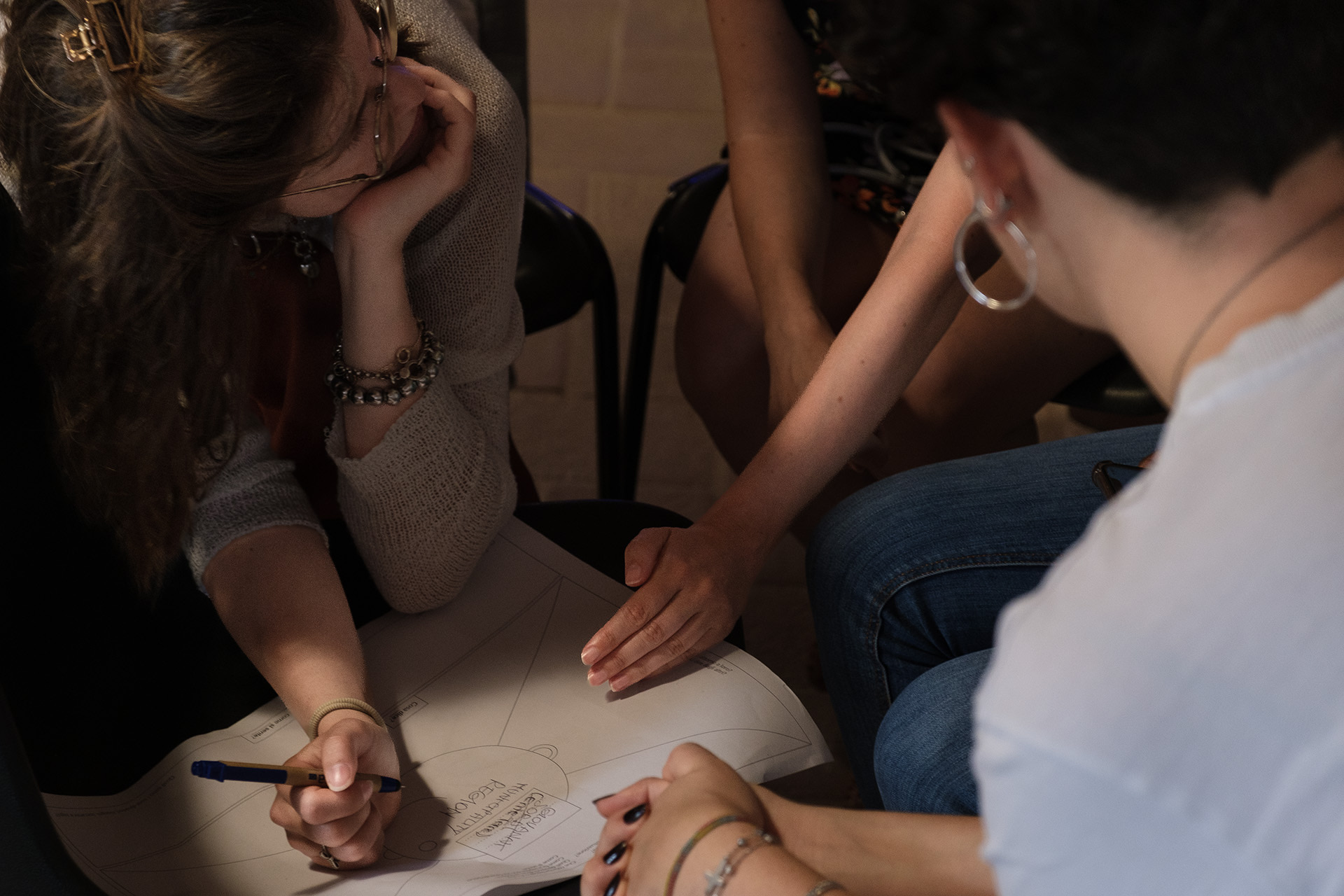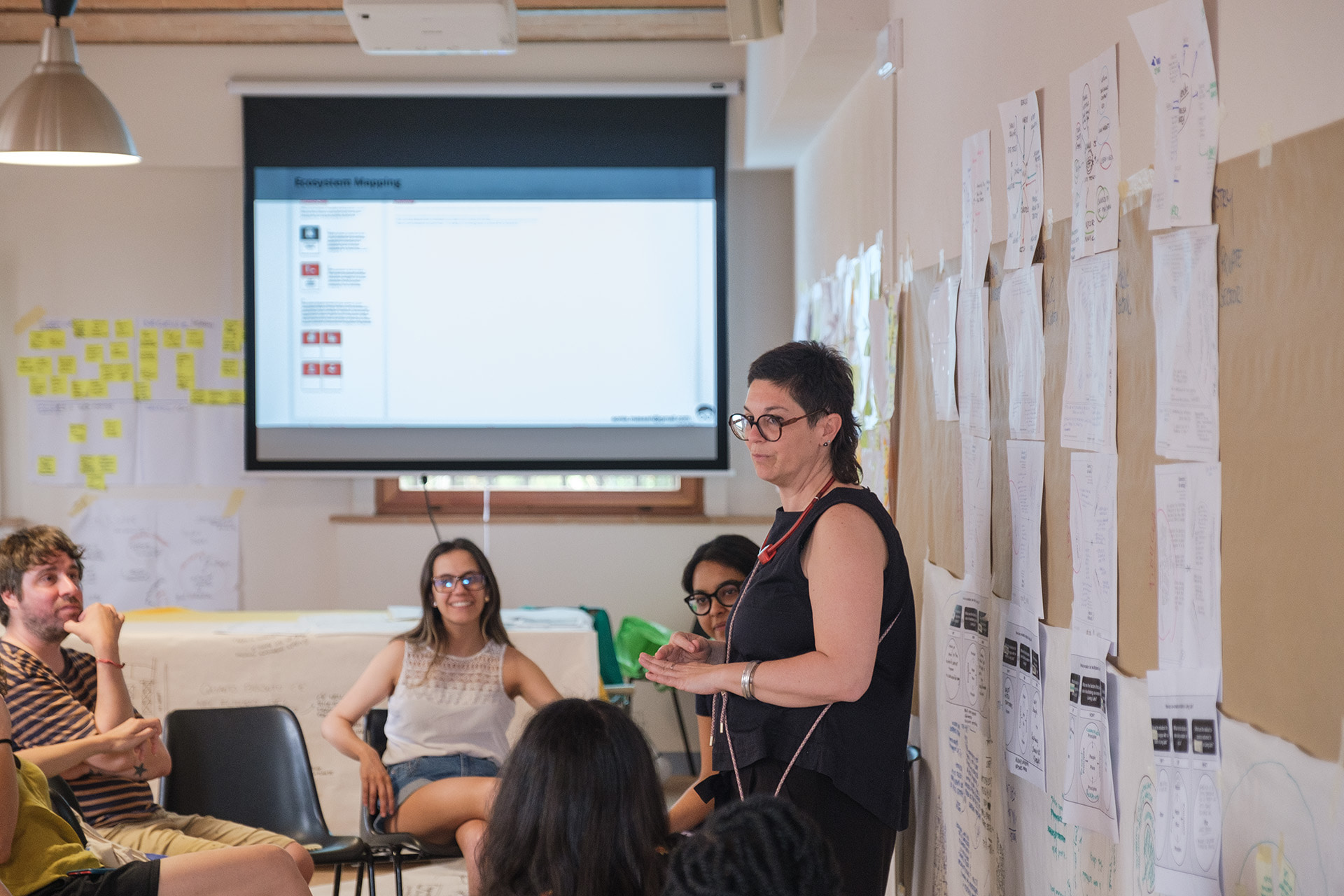Funded under the National Recovery and Resilience Plan (NRRP), Mission 4 Component 2 Investment 1.3, Theme 10.
The complexity of food environments addressed with participatory methods: the mini-doc from the four-day workshop of Spoke 1.
Spoke 1 organized a four-day workshop on the tools and methods of participatory research dedicated to young researchers.

Giulio Burroni
Communication manager
Scientific research plays a primary role in supporting the sustainable development of agri-food supply chains because it can ultimately guide policies based on evidence and measure their results. However, its impact will be truly effective only if transdisciplinary approaches and participatory methods are applied, directly involving local stakeholders. For this reason, Spoke 1 of OnFoods organized a four-day workshop on the tools and methods of participatory research dedicated to young researchers.
"When studying and seeking solutions for food environments, we often deal with 'wicked problems,'" says Professor Alessio Cavicchi from the University of Pisa, "that is, problems that may never find the solution we envision, and especially problems that do not have solutions valid for everyone, the so-called 'one size fits all solution.'
The application of participatory methods — typical of human values centered design — in the agri-food field is crucial for addressing its complex challenges. These methods, which place the needs and experiences of end users at the center of the decision-making process, can indeed foster an integrated and collaborative approach throughout the entire agri-food supply chain.
"Traditionally, the agri-food sector," says Filippo Arfini, coordinator of Spoke 1, "has been analyzed in distinct segments: agricultural, industrial, distributive, and finally, the consumer. However, thinking of these segments as interconnected nodes would allow for the development of more effective coordination mechanisms. Through a participatory approach, innovative solutions can be created to reflect the real needs of all the actors involved, promoting both top-down actions, led by industry or policy, and bottom-up actions, where consumers organize themselves to improve product quality and reduce costs. This method not only enhances the sustainability and resilience of the sector but also stimulates continuous and constructive dialogue among all participants in the supply chain."
To put a participatory approach to research into practice, it is necessary for young researchers to adopt approaches, attitudes, and working methods based on listening, empathy, systems thinking, iteration, and rapid prototyping of ideas. Once they have familiarized themselves with these methods, they should apply them concretely in their research.
On these foundations the Tenuta Lab was born: a work program promoted by Spoke 1 of OnFoods, which took place at the Suvignano farm from June 17 to 20.
Four days of study, research, and co-creation involving PhD students, research fellows, researchers, and professors in a program that encouraged participatory training and collaborative design, fostering an attitude towards co-designing innovative and transdisciplinary solutions.
"The idea of this program was to stimulate the researcher’s creativity," says Sonia Massari, a researcher at the University of Pisa, "to take them beyond predefined schemes and trajectories, breaking down disciplinary differences while also trying to open new channels with the stakeholders they work with."

Living Labs are the most suitable methodological expression to scientifically develop this idea of “listening and action” research; they are shared work environments and moments where co-creation is stimulated among different perspectives on a problem: for example, those of companies, science, governments, and policymakers, but especially those of citizens and communities.
New skills are needed—that are far from being merely "soft" — to manage the dynamics emerging from the convergence of many and different viewpoints. Hence the need for a full immersion dedicated to the young researchers of Spoke 1, who will one day apply these same methods in their regions and research.
The setup of this training was different from the usual approach in Italian academia: instead of traditional lectures, a peer-to-peer format was used, where all the young researchers contributed with their knowledge and skills.
Chiara Cerbone, a research fellow in Comparative Public Law at the University of Parma, noted that the participatory approach was a pleasant novelty in her experience as a jurist: "I return from Suvignano with a wealth of experiences that I believe I can apply in my field of research, which historically has some difficulties in interfacing with the practical aspects of the regulatory models it deals with."
The idea is to form a "new researcher" who, in addition to the vertical competencies of their discipline, can also develop skills and abilities to engage with "the other" from different disciplines.
"The approaches we experimented with in Suvignano," comments Raffaele Pasquariello, a PhD student in 'Mind, Gender and Languages' at the University of Naples Federico II, "give us the tools to overcome not only disciplinary but also cultural barriers among us researchers. Coming into contact with scholars from agricultural, economic, medical, scientific fields, etc., always gives us a different perspective, and interdisciplinarity is something that must be earned precisely because it is very difficult to put into practice."
A mini-documentary was produced from the Suvignano Tenuta Lab experience, created by the communication, design, and development company Dinamo, together with the researchers who participated in the four-day workshop.

Partecipants and Acknowledgments
Participants in the workshop:
Filippo Arfini, Alessio Cavicchi, Michele Maccari, Davide D’Ascoli, Bastian Goldel, Tarek Allali, Belinda Borrello, Chiara Cerbone, Sabrina Arcuri, Giovanni Ottomano Palmisano, Sonia Massari, Lucia Viganego, Giulio Cascone, Irene Bassi, Abigail Fagbohun, Annapia Ferrara, Chiara Mignani, Teresa Tugliani, Rungsaran Wongprawmas, Audrey Cavalieri, Benedetta Mura, Raffaele Pasquariello, Giulia Gallo, Roberta Gravagno, Marianna Guareschi
Acknowledgments to local entities:
Giovanni Sordi, Ente Terre Regionali Toscane; Giacomo Baffetti, Agronomist at Tenuta Suvignano; Giovanna Vannetti, Libera; Davide Ricci, Mayor of the Municipality of Murlo; Gabriele Berni, Mayor of the Municipality of Monteroni d’Arbia; Franco Rossi, Eroica; Laura Scafetta, Terra Eroica; Maddalena Sanfilippo, Tempio del Brunello; Azienda Agricola Pieve a Salti; Roberto Barbi and family, Azienda Agricola Barbi; Valentina Pascucci, Mondomangione; Catiuscia Marcantoni, Tenuta Suvignano; Letizia Cosci, Museo della Mezzadria di Buonconvento; Elisabetta Bargagna, ASTI Srl; Alessandra Meoni, European University Alliance Circle U, University of Pisa
Video production:
Dinamo srl, communication management; Milo Adami, direction, shooting, and editing; Giulio Burroni, writing and coordination.

Giulio Burroni
Communication manager
Specialist in Communication and Project Management with over 8 years of experience in agency work. Currently involved in communication, branding, and design projects within the public administration, research institutions, and university sectors


